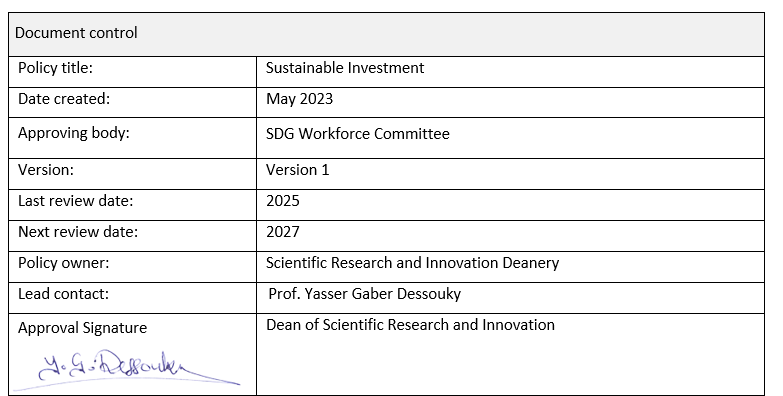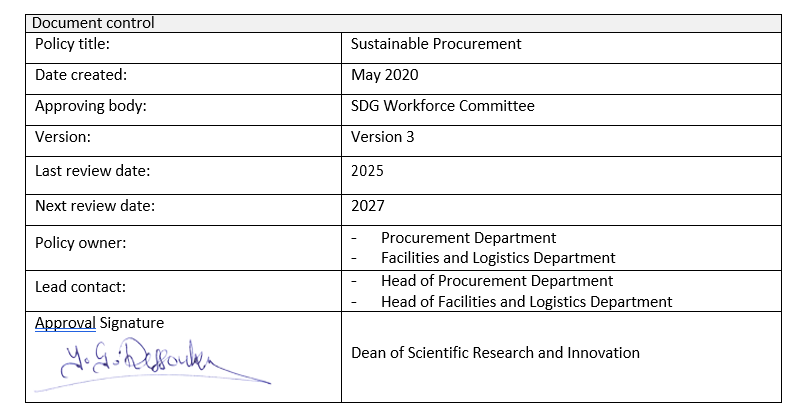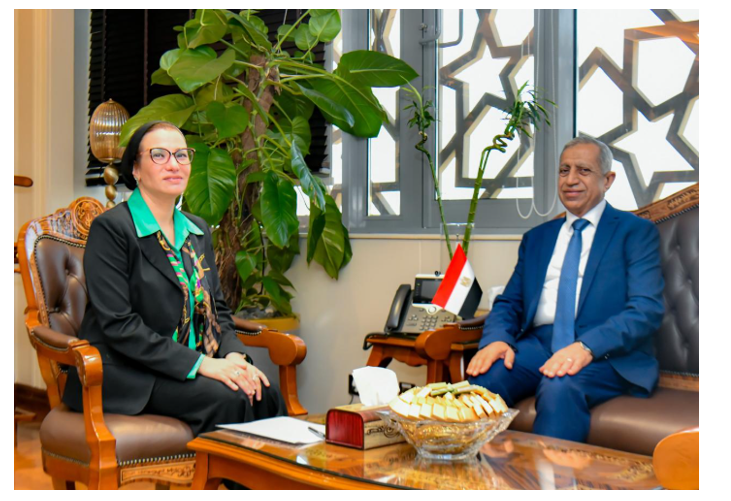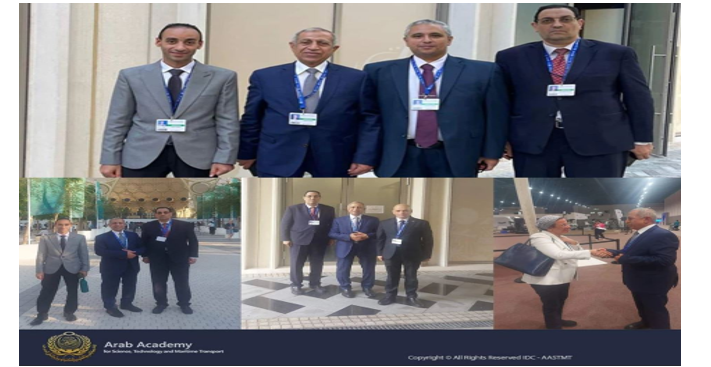
AASTMT is dedicated to integrating its sustainability strategies across the entire supply chain, fostering collaboration and shared responsibility to achieve sustainable development goals. By ensuring that upstream partners adhere to its procurement policies, the university promotes ethical practices, environmental sustainability, and resource efficiency in the sourcing of goods and services. This approach not only strengthens supplier relationships but also reinforces AASTMT’s commitment to responsible consumption. Likewise, downstream partners are required to comply with AASTMT’s waste management policies, emphasizing proper waste handling, recycling, and disposal. By extending its sustainability framework to all supply chain partners, AASTMT creates a cohesive system that minimizes environmental impact and promotes accountability at every stage. This holistic approach highlights the university’s leadership in embedding sustainable practices into its operations, setting an example for institutions and organizations to follow, and building a collaborative network committed to a sustainable, environmentally conscious future. AASTMT Sustainable Investment Policy indicated under title “Policy Statements”, 5 policies are indicated in this section to explain the disposal procedures.
AASTMT Sustainable Investment Policy
Introduction
AASTMT considers a comprehensive and forward-looking approach when making investment decisions. This approach encompasses various aspects, including environmental sustainability, social responsibility, and corporate governance considerations. The AASTMT Investment Policy indicates the following:
Transparency and Accountability
AASTMT is committed to transparency and accountability. We make this policy publicly available on our website and other official platforms. We also publish an annual Sustainability Investment Report, detailing our investment actions and their alignment with our sustainability goals.
We believe this policy will enable us to contribute to a more sustainable future and align our actions with our commitment to social responsibility. We understand that our financial decisions have the power to drive sustainable practices, and we are dedicated to using this power response.
We invite our stakeholders, students, faculty, staff, and partners to join us on this journey towards a more sustainable and equitable future. We encourage feedback and suggestions on this policy as we believe that collective and informed action is key to driving sustainability.
Policy Statements

Read our policy Sustainable Investment Policy
Through applying this policy, AASTMT will be committed to ensuring that our investments contribute to a sustainable future is outlined in our Sustainable Investment Policy.
Sustainable Procurement Policy
Background
The objective of this policy is to delineate the AASTMT's stance regarding the administration of sustainable and ethical procurement. The Sustainable Procurement Policy of the Arab Academy for Science, Technology, and Maritime Transport (AASTMT) establishes the essential sustainability criteria for the procurement of products and services by the institution. The policy also establishes the criteria and guidelines for the responsibilities of AASTMT buyers in relation to sustainable procurement activities. The Sustainable Procurement Policy mainly aims at waste reduction, with a hierarchical approach that emphasises reduction as the primary strategy, followed by reuse and ultimately recycling. In line with this perspective, it mainly focuses on minimising superfluous purchases, followed by a prioritisation of acquiring surplus or multi-purpose goods prior to procuring recyclable or compostable alternatives.
Mission and values
AASTMT is acknowledging that procurement activities exert a substantial influence on the environment. Consequently, a strong dedication is held to minimise this impact to the greatest extent feasible. The present Sustainable Procurement Policy aligns with the principles governing a comprehensive procurement strategy, encompassing production and service, and is consistent with the University's broader environmental sustainability policies, including Climate Action Progress and its dedication to the People.
AASTMT actively promotes and advocates for its suppliers and subcontractors to effectively address and mitigate the environmental and social consequences arising from their business activities. Suppliers and subcontractors are advised to modify their business practises as necessary in order to comply with AASTMT policy and practices. In order to fulfil our obligations, we will:
Policy Statement
The AASTMT recognizes its buying decisions' impact on the economy, society, and environment. AAST uses this as a chance to make ethical and sustainable purchases of goods and services. This policy attempts to incorporate environmental and socioeconomic considerations at each phase of the process of buying goods, mirroring the commitments outlined in the AASTMT's sustainability policy.
To assist us in fulfilling our obligations, the AASTMT seeks to
Objectives
Supplier evaluation
The suppliers’ sustainable environmental credentials are incorporated, to the extent feasible, into the suppliers' evaluation procedure.

Sustainable Procurement Policy
This policy is aligned with the previous one. This policy aims to outline the AASTMT’s position on the management of ethical and sustainable procurement.
AASTMT and Ministry of Environment Strengthen Partnership to Launch Climate Information Center and AI-Based Environmental Initiatives
The Arab Academy for Science, Technology and Maritime Transport (AASTMT) and Egypt’s Ministry of Environment, led by Dr. Yasmine Fouad, held a high-level meeting to expand cooperation on environmental initiatives and future projects. The discussions focused on launching a “Climate Change Information Center”, designed by AASTMT’s technology company, to provide data and insights on climate change and national mitigation efforts. The collaboration also includes the development of AI-powered digital applications aimed at reducing carbon emissions and plastic consumption, with AASTMT engineering students designing tools to promote sustainable practices. The two sides further agreed to organize a national competition and award ceremony in 2025 for the best student projects in carbon reduction and green industry innovation. This partnership reinforces AASTMT’s commitment to advancing environmental sustainability, applied research, and youth engagement in support of Egypt’s Vision 2030.

AASTMT Partners with Environment Ministry on Waste and AI Projects
AASTMT and Alexandria Governorate Launch Waste Management Competition Across City Beaches to Promote Environmental Awareness
The Arab Academy for Science, Technology and Maritime Transport (AASTMT), in coordination with the Alexandria Governorate and Egypt’s Ministry of Environment, announced plans to launch a competition among Alexandria’s beaches focused on effective waste management and environmental sustainability. During a meeting with Governor Mohamed El-Sherif, Dr. Alaa Abdelbary, Vice President of AASTMT, explained that the initiative forms part of the TOMALY Project—“Waste Management Systems for Sustainable Tourism and Marine Ecosystem Protection.” The project aims to build local and international networks for waste management, develop sustainable solutions for tourism-related waste, and protect marine ecosystems, ultimately contributing to economic, health, and environmental improvements in line with Egypt’s Vision 2030 and national climate goals.

AASTMT Partners with Alexandria in Beach Waste Initiative
AASTMT Plays Leading Role in Developing Egypt’s Solid Waste Management System and Delivering 23 Sanitary Landfills Nationwide
The Arab Academy for Science, Technology and Maritime Transport (AASTMT) announced its pivotal role in developing Egypt’s Solid Waste Management System over a four-year period (2019–2023). In collaboration with relevant government ministries, AASTMT contributed to building the system’s infrastructure, training and qualifying personnel across Egypt’s governorates to operate, manage, and monitor all stages of waste management—from collection and transportation to treatment and safe disposal. The Academy supervised the design, construction, testing, and operation of 23 sanitary landfills across 16 governorates, including the latest facility in Bir El-Abd, North Sinai, serving 100,000 residents. AASTMT also guided the government in localizing recycling technologies, promoting domestic manufacturing of sorting and recycling lines, and training over 1,500 environmental and municipal staff to ensure sustainable, efficient waste management. This achievement aligns with AASTMT’s strategic vision to support Arab governments in implementing green projects and advancing the Sustainable Development Goals through education, research, and applied innovation.

AASTMT Leads Egypt’s Waste Management Development
AASTMT President Participates in COP28 to Strengthen Climate Action and Youth Empowerment
H.E. Prof. Dr. Ismail Abdel Ghafar Ismail Farag, President of the Arab Academy for Science, Technology and Maritime Transport (AASTMT), participated in the United Nations Climate Change Conference (COP28) held in Dubai, UAE, from November 30 to December 12, 2023. During the conference, AASTMT organized several technical sessions under the Arab League Pavilion, showcasing Arab and international collaboration on sustainability and innovation. On the sidelines of the event, Dr. Abdel Ghafar met H.E. Dr. Yasmine Fouad, Egypt’s Minister of Environment, to discuss national climate efforts aligned with Egypt’s Vision 2030. The Minister commended AASTMT for integrating environmental awareness and sustainability practices into its academic programs and for empowering youth participation in environmental projects.
